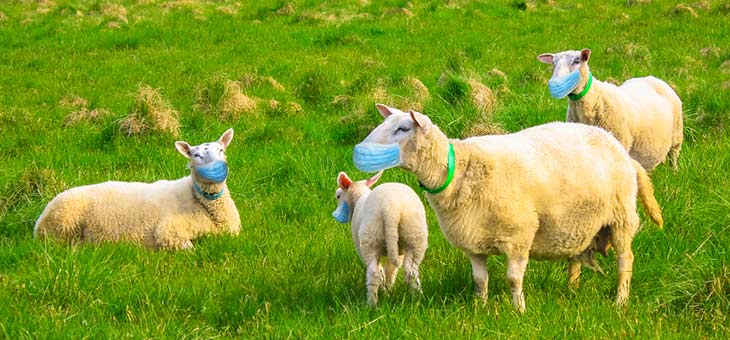Infectious disease experts say Australia’s COVID experience will become a “pandemic of the unvaccinated”, as the Delta strain’s high infection rate – even among vaccinated people – turns achieving herd immunity into an “impossibility”.
In what experts say is already playing out in small numbers in the New South Wales outbreak, unvaccinated people are being disproportionately represented in the intensive care wards across the world as the infectious Delta strain takes hold.
Current numbers from NSW show of the 66 people in ICU, 59 are not vaccinated and seven have had one dose. No-one currently in ICU or requiring ventilation has been fully vaccinated.
It comes as jurisdictions across the world report increased case numbers, with US President Joe Biden calling it a “pandemic of the unvaccinated” as parts of the US with low vaccination rates report a new wave of deaths amongst the unvaccinated population.
Local experts say in addition to the US example, data from multiple international jurisdictions across the world means the concept of herd immunity is now an “impossibility”.
“It’s simply not going to happen,” University of South Australia biostatistics and epidemiology chair Adrian Esterman said.
“It [herd immunity] requires people getting immunity from being vaccinated and immunity from contracting COVID, and recovering.
“In the UK, for example, more than 90 per cent of people have either been vaccinated or recovered from COVID and even they haven’t got herd immunity.
“In Australia, we’re relying purely on vaccination, as we don’t have enough people who had had COVID and recovered.
“And then in Australia we have the 20 per cent of the population who don’t want to be vaccinated.”
This was backed by UNSW Kirby Institute virologist Greg Dore, who pointed to the example of Iceland to show herd immunity was “not attainable with the Delta variant”.
Iceland, which has 93 per cent of the population 16 years of age or older vaccinated, reported 2783 cases over the past 30 days – its largest wave since the pandemic began.
Yet Iceland has had no deaths for the past 30 days attributed to COVID.
“So, mass vaccination can both provide ‘disease immunity’ and ‘herd immunity effects’ [and] enhance community control, but just not complete herd immunity,” Professor Dore said.
“Over the next decade, [it’s] likely we will be infected multiple times. [And it’s] much, much better if [the first infection] is in a vaccinated state.”
Vaccination our ‘best chance’
According to Westmead Institute for medical research virologist Tony Cunningham, the data suggested there was an “unpleasant lesson” ahead for Australia.
“The difficulty is that of the 10, 15 or 20 per cent of people who don’t get immunised, they now cannot rely on the rest of us to protect them,” Professor Cunningham said.
“Biden’s right, it’s becoming a ‘pandemic of the unvaccinated’.”
In addition to the Iceland example, Professor Cunningham pointed to a recent study from Singapore that showed the viral load of the Delta strain in an infected person’s nose was similar for both vaccinated and unvaccinated people at diagnosis.
But, he said, the study showed viral loads decreased faster in vaccinated individuals.
He said the study – and the latest live data from around the world – showed it would likely be harder to prevent transmission of the virus even amongst vaccinated people.
“But the aim of vaccination has always been to protect the vulnerable from severe disease, death and long COVID [and] now we potentially have to bring children into the equation,” he said.
“But our best chance is to get the highest level of people vaccinated, hopefully then you will get collective reduction and reduce the circulation of the virus.”
Delta has ‘changed things’
As more Australians become exposed to the Delta variant through outbreaks across multiple states, the effectiveness of the three vaccines on offer has become a more potent issue for the population.
A Public Health England analysis of about 14,000 cases found two doses of the AstraZeneca vaccine was about 92 per cent effective against hospitalisation from the Delta variant.
That’s comparable with the 96 per cent effectiveness against hospitalisation offered by the Pfizer jab. Experts say Moderna, which will be available to Australians from next month, is largely the same as Pfizer.
Dr Kylie Quinn, a vaccine expert from RMIT University, said it was “becoming clear” that the Delta strain did reduce the efficacy of the vaccines, or the number of vaccinated people protected from contracting COVID.
“The CliffsNotes version is ‘Delta has changed things’,” she said.
“There’s reduced vaccine efficacy against developing symptoms, but how Delta impacts on transmission of the virus, we’re still getting a grip on.
“But if you’re trying to understand this benefit of vaccination, it’s pretty clear that there’s still really substantial protection for severe illness, hospitalisation and death for all of these vaccines against Delta.”
Dr Quinn said the vaccines’ ability to protect against severe illness was the “key issue” as the lack of herd immunity meant all Australians would be “meeting the virus” at some point.
“The clear message is we have to treat Delta with more caution,” she said.
“And the tools we use to fight Delta are vaccines in addition to those public health measures.”
 © 2020 Australian Broadcasting Corporation. All rights reserved.
© 2020 Australian Broadcasting Corporation. All rights reserved.
ABC Content Disclaimer

